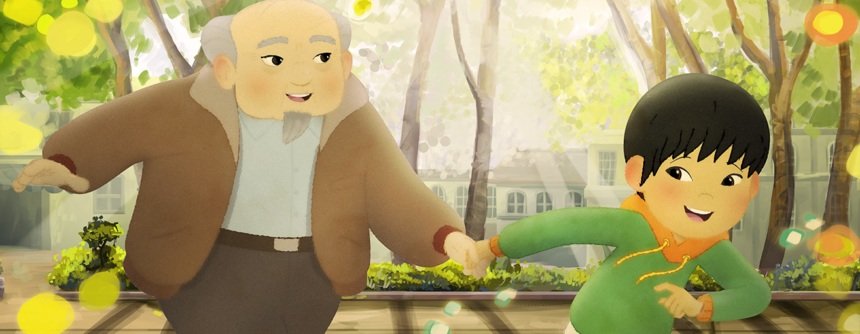For the first time, a family story about winning and losing has been made into an animated film. A special screening of the feature-length animated film “Eu e Meu Avô Nihonjin (My Japanese Grandfather and Me),” which explores the history of Japanese immigrants, was held at a shopping mall in São Paulo on September 4th. Produced by Pinguin Contento and distributed by H2O Films, the film was attended by representatives from cultural institutions and Japanese-Brazilian organizations, who celebrated the film’s completion ahead of its nationwide release on October 16th.
The story begins when Noboru is given homework at school to write down his family history, which brings him face-to-face with his grandfather, with whom he has never spoken appropriately until then. At first, he is repelled by his grandfather’s strict attitude, but gradually he finds himself drawn into this unexpected family history.
This animated Brazilian film explores the generational gaps and cultural clashes that exist in Brazil, a country with a large immigrant population, through the eyes of a family of immigrants from Japan, a country culturally far removed from the West. It is based on the novel “Nihonjin” by Oscar Nakasato, which is based on a true family story.
This powerful work won the 2012 Jabuti Prize (Brazil’s most prestigious literary and publishing award). This film has been adapted into a gentle narrative style that is accessible to children. When asked about his impressions of the film, Nakasato himself (61 years old, third generation) commented, “I was deeply moved.
The story has been adapted for children, but the essence of the original remains the same. I’ve heard from descendants of Italian descent who have read my novel that they’ve had the same experience. This is also the story of a Brazilian family. Many Japanese immigrants are unaware of the complex history of the struggles and victories of Japanese immigrants. I think it’s worth seeing for all children.” Actor Kenichi Kaneko, who voiced the film, smiled and said, “It was like watching my own life.
Even though I was the one providing the voice, I cried a lot this time.” Takashi Yamanishi (31, third-generation Japanese), a Japanese language teacher online (https://123japones.com.br/), reminisced about his own past as evoked by scenes from the film, saying, “I liked how the movie portrayed the history of Japanese immigrants in a pop style. It skillfully weaves in anecdotes familiar to Japanese families, such as being told to take off your shoes inside the house from a young age.
This effectively conveys how Japanese culture, which is not found in Brazil, naturally coexists in everyday life. Although I’ve now firmly established my identity as a Japanese-Brazilian, I was born in Japan and considered myself Japanese as a child. I still vividly remember when I received my first identity card (RG) at age 10 and cried when I saw it said I was Brazilian.”Before the screening, director Celia Catunda and executive producers Kiko Mistroligo and Ricardo Rogino took the stage to give speeches.
The film’s world premiere at the Annecy International Animated Film Festival in France in June attracted international attention. After the screening, some commented that it is a universal story that resonates not only with the Japanese community but with people at large. Attention will be focused on the reaction after the 16th.











